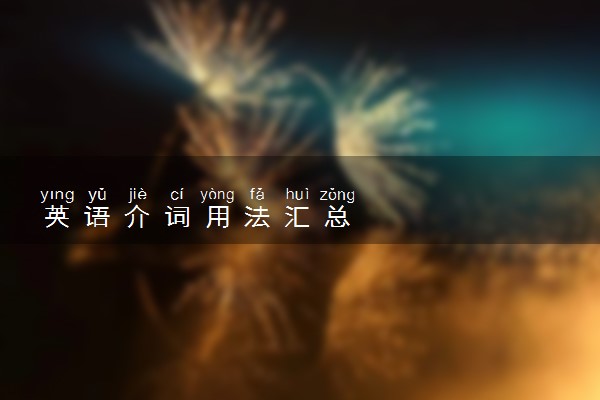介词一般用于名词或代词前,表示该词与句中其他成分的关系。in可表示在某时间,by可表示用某种方式,on可表示以...的方式等。

一.表示工具或手段的介词:by,with,on
1.by用某种方式,多用于交通
I went there by taxi.
我坐出租车去那儿。
2.with表示“用某种工具”,必须用冠词或物主代词。
He broke the window with a stone.
他用石头把玻璃砸坏了。
3.on表示“以...方式”,多用于固定词组。
They talked on the phone.
他们通过电话进行交谈。
二.表示方位的介词:in,to,on
1.in表示在某地范围内。
Shanghai is in the east of China.上海在中国的东部。
2.to表示在某地范围外。
Japan is to the east of China.日本位于中国的东面。
3.on表示与某地相邻或接壤。
Mongolia is on the north of China.蒙古国位于中国的北边。
三.表示特征、方面与方式、心情、成语:in
The Democratic Party was then in power. 那时民主党执政。
They found the patient in a coma. 他们发现病人处于昏迷状态。
I only said it in fun. 我说这话只是开玩笑的。
四:表示年、月、年月、季节、周:in。
in 1997 在1997 年
in April 在四月
五:表示方向:at,to
1.at 表示方向时,侧重于攻击的目标,往往表示恶意;
She came at me. 她向我扑过来。
He shouted at the old man. 他大声喝斥那老人。
2.用to 表示方向时,突出运动的位置或动作的对象,侧重表示善意。
She came to me. 她向我走过来。
He shouted to the old man. 他大声向那老人说。
六.表示关于:on,about,of
1.on指关于学术性的或严肃的事
It’s a textbook on the history of china.
它是一本有关中国历史的教科书。
2.about指关于某人或某事物的较详细的情况。
Can you tell me something about yourself?
你能告诉我关于你自己的事情吗?
3.of指提到或谈到过某人或某事。
He spoke of the film the other day.
他前几天提到了这部电影。